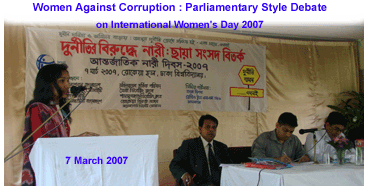Published: 07 March 2007

Keeping the slogan ‘Women against corruption’ ahead, a daylong debate competition was arranged at the TSC Auditorium, Dhaka University for observing ‘International Day of Women’ on 8th March 2007. Students from various colleges and universities around the country participated in the daylong debate competition organized by TIB. Executive Director of TIB inaugurated the competition and among others delivered by the Joint- Editor of the daily Samakal, Mozzamel Hossain delivered goodwill speech in inaugural session. Debater Kaniz Fatema Chowdhury administered the oath against corruption. After opening, a rally was arranged participating more than five hundred which crossed Dhaka University campus.
Participants debated on the topics concerning ‘Women against Corruption’ in various sessions of parliamentary style debate competition. Enthusiastic student speakers spoke on the various nature and aspects of deprivations faced by women in all spheres of national, social, political and economic life. They unanimously said that steps must be taken for preventing influences of corruption on women. Women, they agreed, must be engaged with the main stream national development programmes. Competition mainly focused on the importance of raising women’s awareness on the harmful effects of corruption on women.
A baroari debate took place during the first session of the competition. Four groups were selected through lotteries at the beginning of this session. Subjects selected for these four groups were respectively a) to prevent influence of corruption on women... b) to raise women’s participation in administration... c) to raise women’s participation in preventing corruption in education sector... d) to raise women’s participation in preventing corruption in health sector... Four incomplete sentences were selected for these four groups. A separate group was formed with the best debater of each party. A mid-session debate was held and the two best debaters from this session were then chosen as the leaders of the government and opposition party. Finally, among twelve debaters, seven were chosen as government party members and five were chosen as opposition party members who spoke on a bill titled ‘Prevention of Corruption and Women;s Empowerment Bill, 2007’ placed before the shadow parliament. The main theme of the bill was, ‘Prevention of corruption is only possible through empowerment of women.’ Professor Asif Nazrul of Dhaka University and Tanveer Mahmud of TIB acted respectively, as the speaker and the deputy-speaker of the Parliament. A few teachers of the Dhaka University and ex-debaters of DUDS were the judges of different sessions. The best debater adjudged in the Parliamentary style debate competition was Kuasha Pal of Rokeya deabting arena of Dhaka University. First runner-up adjudged was Junannisa Ahmed Trina of Faridpur Sarada Sundari women’s Government College and a volunteer of TIB. The second runner-up selected was Sushmita Chowdhury of Dhaka University Shamsunnahar Hall Debating Club. Fourth best debater from the four groups selected from the ‘Baroari Debate’ were Fahima Tasnim Tania of Rokeya Bitorka Angon, Sushmita Chowdhury of Shamsunnahar Hall Debating Club, Sultana Yasmin Sonia of Fazilatunnesa Debating Association and Lopamudra of Shamsunnahar Hall Debating Club. Three winner of the Parliamentary Style Debate and four winner of Baroari Debate were awarded with crests and certificates. Dhaka University Debating Society, East West University, Independent University, Moitree Debating Club, Rokeya Debating Arena, Shamsunnahar Hall Debating Club, Stamford Debating Forum and Fazilatunnesa Debating Assocation were co-organizers of the competition. The media partners in the competition were the Daily Samakal, BanglaVision and Radio Today FM 89.6.
Professor Tajmeri S A Islam, Prof. Atiqur Rahman, Prof Razia Akhter Banu, Dr. Dil Rowshan Zinnat ara Nazneen, Prof. Tahmina Akhter and the TIB Executive Director, Dr. Iftekharuzzaman and many distinguished guests were present at the prize-giving ceremony in evening.







